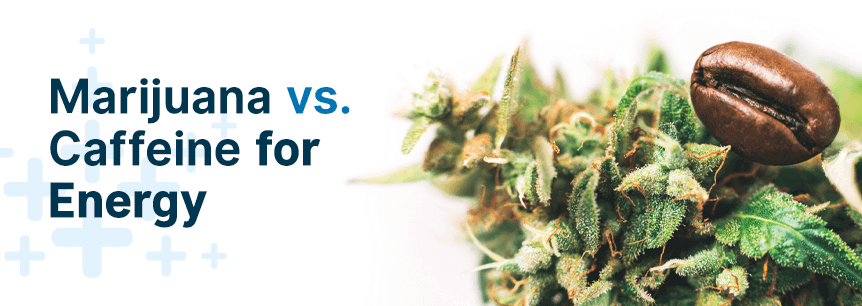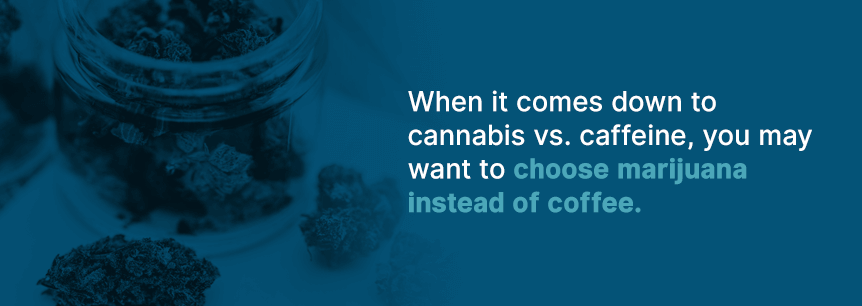
If you’re reading this article before noon, chances are you have a cup of steaming coffee nuzzled in your hand. You may even be sitting in your favorite coffee shop as we speak, enjoying an energizing sip of caffeine brewed in your favorite flavor.
It’s not uncommon for Americans to enjoy a daily cup of coffee. In fact, a staggering 62 percent of adults enjoy this caffeinated beverage daily. But while most people in society aren’t likely to so much as blink an eye when avid coffee drinkers reach for another cup of coffee for a jolt of energy, marijuana often doesn’t receive the same level of acceptance.
But marijuana is touted for its energy-inducing side effects, too. However, people are much more likely to reach for a cup of coffee rather than a form of cannabis when they want to experience higher levels of energy. Caffeine is as much of a drug as marijuana, so why do people tend to reach for this hot beverage — and not cannabis — when they’re looking to reenergize? Is marijuana more effective than coffee at stimulating energy? Do both substances work in the body in the same way?
Below, we’ll answer all the marijuana vs. coffee debate questions you’re likely to have.
When you hear the words caffeine and cannabis mentioned in the same sentence, you aren’t likely to think of the similarities shared by these two substances. However, they have quite a few characteristics in common — which shouldn’t come as a surprise, considering they’re both used to increase energy levels.
Both caffeine and cannabis are derived from plants and have been used by people for thousands of years to stimulate an energetic effect. However, caffeine is more widely accessible and doesn’t hold the negative stigma generally attached to marijuana.
Coffee is available in a wide variety of options, too. From iced coffee to caffeine chewing gum, there’s no shortage to the number of ways you can satisfy your caffeine cravings. In some states, cannabis requires a medical prescription and is only accessible by qualified adults in a limited variety of forms.
But while marketers and businesses tend to shed a favorable light on coffee, you may just find that marijuana is the ideal option when it comes to experiencing your necessary get-up-and-go.
You may want to put down the coffee beans and pick up your phone to Google the directions to your nearest marijuana dispensary. While coffee fanatics are quick to credit their vitality to their morning brew of Starbucks, it’s worth considering putting your caffeine on the back burner instead. Marijuana may be the better choice when it comes to seeking long-lasting and safe levels of energy.
Don’t believe us? Here’s a list of the top three reasons that cannabis emerges as the victor in the marijuana vs. coffee debate.
It’s no secret that coffee does give you a jolt of energy. However, this sense of oomph is often short-lived and comes with a post-caffeine crash. But why?
Unlike cannabis, caffeine doesn’t actually energize you — it just suppresses your lethargy until later. The reasons you feel more energy when ingesting coffee is that caffeine blocks adenosine receptors in the brain. Adenosine is a normal hormone that is crucial for sleep regulations and helps signal feelings of tiredness to the brain.
So, when you reach for a cup of coffee after a few hours of shut-eye, caffeine will suppress feelings of lethargy. However, once your body metabolizes the caffeine, a buildup of adenosine occurs that causes your body to experience a rush of these lethargy-inducing receptors all at once.
Cannabis, on the other hand, won’t leave you with a mid-day crash. Instead, you’re likely to feel content or relaxed once marijuana begins to leave your system, making it a better long-term solution for bouts of lethargy than caffeine.
There’s a reason the phrase “caffeine jitters” is likely to ring a bell for most coffee users. The second that coffee leaves your system, you’re not unlikely to feel on-edge, jittery, irritable and, most notably, sluggish.
While many coffee enthusiasts laugh these symptoms off as a signal that they need their next cup, the withdrawal symptoms associated with this substance are serious issues to consider.
Research studies connect high levels of caffeine to an increased risk for health complications, including seizures, cardiac arrhythmias and poisoning or death. While severe consequences, such as death, are rarer, there’s a definite higher risk when consuming large amounts of coffee — especially when considering there are no recorded deaths due to a cannabis overdose.
Contrary to caffeine, cannabis does not provoke disruptive symptoms or side effects. When you stop taking marijuana, your body won’t feel an irresistible urge to consume it again.
Whether someone is feeling worn-down, unenergetic, or simply in need of a quick rush of energy, they may be likely to start up their coffeemaker to rid themselves of any unwanted feelings of tiredness. But while caffeine is often advertised as an energy-inducing substance, most don’t know that the energy you feel from caffeine is more from stifled feelings of tiredness rather than a natural state of vigor.
What does this mean? As previously noted, caffeine suppresses adenosine, the hormone responsible for feeling tired. The cannabinoids found in cannabis, however, interact with the brain to produce real energy rather than just repressing hormones tied to lethargy.

This means that when it comes down to cannabis vs. caffeine, you may want to choose marijuana instead of coffee when you’re looking for authentic energy that won’t leave you crashing mid-day.
Ultimately, cannabis can produce just as much — if not more — energy than caffeine. The major difference is that when you choose marijuana, you’re putting a substance in your body that is more likely to eliminate any feelings of tiredness while also helping you enjoy an added sense of vitality that lasts throughout the day.
No Information on MarijuanaDoctors.Com should be used to diagnose, treat, prevent or cure any disease or condition. You can view our Full Disclaimer here.